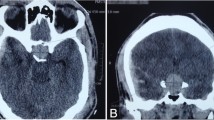Abstract
Introduction
We describe a case report of panhypopituitarism after traumatic head injury. A previously healthy young man suffered a closed head injury and multiple spinal fractures after a motorcycle accident.
Methods
His treatment in the intensive care unit was prolonged because of numerous problems with raised intracranial pressure, hemodynamics, and electrolyte balance.
Results
Eventually, hypocortisolism and other pituitary hormone deficiencies were diagnosed. Magnetic resonance images showed incoherent pituitary stalk and re-review of the first computed tomography scans of the day of the accident confirmed hemorrhage in the infundibulum.
Conclusion
This case and review of the literature suggests that hormone deficiencies are not uncommon after head injuries.
Similar content being viewed by others
References
Benvenga S, Campenni A, Ruggeri RM, Trimarchi, F. Clinical review 113: Hypopituitarism secondary to head trauma. J Clin Endocrinol Metab 2000;85:1353–1361.
Kelly DF, Gonzalo IT, Cohan P, Berman N, Swerdloff R, Wang C. Hypopituitarism following traumatic brain injury and aneurysmal subarachnoid hemorrhage: a preliminary report. J Neurosurg 2000;93:743–752.
Lieberman SA, Oberoi AL, Gilkison CR, Masel BE, Urban RJ, Prevalence of neuroendocrine dysfunction in patients recovering from traumatic brain injury. Clin Endocrinol Metab 2001;86:2752–2756.
Agha A, Rogers B, Sherlock M, et al. Anterior pituitary dysfunction in survivors of traumatic brain injury. J Clin Endocrinol Metab 2004;89:4929–4936.
Aimaretti G, Ambrosio MR, Di Somma C, et al. Traumatic brain injury and subarachnoid haemorrhage are conditions at high risk for hypopituitarism: screening study at 3 months after the brain injury. Clin Endocrinol 2004;61:320–326.
Bondanelli M, De Marinis L, Ambrosio MR, et al. Occurrence of pituitary dysfunction following traumatic brain injury. J Neurotrauma 2004;21:685–696.
Dimopoulou I, Tsagarakis S, Theodorakopoulou M, et al. Endocrine abnormalities in critical care patients with moderate-to-severe head trauma: incidence, pattern and predisposing factors. Intensive Care Med 2004;30:1051–1057.
Green HH, Harrington AR, Valtin H. On the role of antidiuretic hormone in the inhibition of acute water diuresis in adrenal insufficiency and the effects of gluco- and mineralocorticoids in reversing the inhibition. J Clin Invest 1970;49:1724–1736.
Linas SL, Berl T, Robertson GL, Aisenbrey GA, Schrier RW, Anderson RJ. Role of vasopressin in the impaired water excretion of glucocorticoid deficiency. Kidney Int 1980;18:58–67.
Masel BE. Rehabilitation and hypopituitarism after traumatic brain injury. Growth Horm IGF Res 2004;14 Suppl A: S108–113.
Author information
Authors and Affiliations
Corresponding author
Rights and permissions
About this article
Cite this article
Takala, R.S.K., Katila, A.J., Sonninen, P. et al. Panhypopituitarism after traumatic head injury. Neurocrit Care 4, 21–24 (2006). https://doi.org/10.1385/NCC:4:1:021
Issue Date:
DOI: https://doi.org/10.1385/NCC:4:1:021




